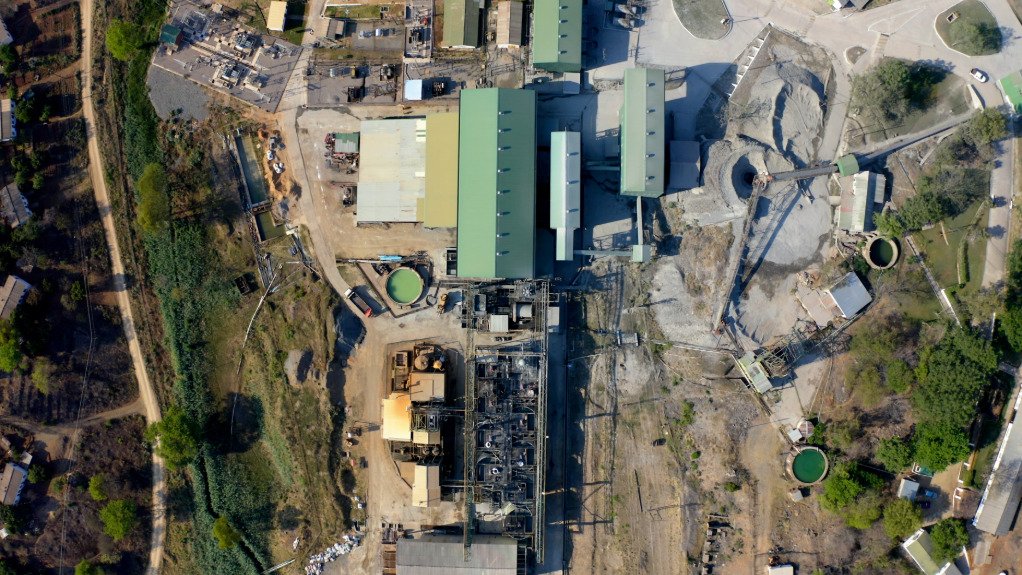
BLANKET INVESTMENT Caledonia Mining Corporation has changed its mining strategy to become a multi-asset gold producer in Zimbabwe
The miner’s flagship Blanket gold mine, about 15 km west of Gwanda, reaches as deep as 1 200 m below the surface, after it started an expansion project in 2015 through the sinking of a new Central Shaft.
Following completion of the shaft and related infrastructure, Caledonia resumed deep-level drilling in January 2023, which focused on the Eroica orebody, where a crosscut has been mined to allow for better access to drill the deeper zones of the steeply dipping orebody.
The change in Caledonia’s strategy is being led by its acquisitions of the Motapa Mining Company in November 2022, Bilboes Gold in January 2023 and the Maligreen brownfield operation in the Gweru mining district, in the Zimbabwe Midlands, in September 2021.
“These three acquisitions have helped Caledonia create a portfolio of high-quality development and exploration projects which clearly underpin this strategy,” says Caledonia Mining Corporation CEO Mark Learmonth.
More shareholder value will be created as the company grows and matures in the country, with the acquisitions also to bolster the group’s current long-term investment in Blanket, which has an expected life-of-mine that extends into the mid-2030s.
Although there are no immediate plans to mine deeper, such action will be seriously considered should the results of continuous deep-level exploration deem it advantageous, he adds.
Embracing Efficiency, Growth
Learmonth says that, as a high-volume capital- intensive business, Caledonia is constantly looking at ways of making its operations more efficient.
He adds that one of the primary challenges associated with investment and operation of a mine in Zimbabwe, is the access to a reliable electricity supply, which is crucial to the operation.
As a result of having to improve its electricity supply and security thereof, Caledonia invested heavily in backup diesel generators and a 12 MW alternating current solar photovoltaic (PV) plant to mitigate this risk.
“Our recent commissioning of the Central Shaft gives us greater operational flexibility across the depth and strike of the mine, as we are now a two-shaft operation, but it has to be managed with the increased electricity use that comes with using two shafts.”
Learmonth praises the company’s technical team who is “doing excellent work optimising this process”.
Blanket has garnered the benefits of supplementing its electricity use with cheap solar power during daylight hours.
Staying Social
“The company’s licence to operate and the long-term success of our business relies on mutually supportive, open and constructive relations with our local communities,” says Learmonth.
Caledonia embraces a corporate social responsibility strategy designed to provide a strategic and sustainable response to community needs. Focus areas are defined under the six sustainability pillars of education, health, agriculture, women and youth empowerment, environment and charity.
“Caledonia was the first indigenised Zimbabwean gold miner and 51% of Blanket was either sold or donated to indigenous Zimbabweans in 2012,” he avers.
The company facilitated the acquisition of a 10% shareholding in Blanket by a trust in favour of its employees, a 16% shareholding by the National Indigenisation and Economic Empowerment Fund of Zimbabwe and a 15% shareholding in Fremiro – an indigenous Zimbabwean shareholder company.
“A further 10% shareholding in Blanket was also donated to the Gwanda Community Share Ownership Trust for the benefit of the local community,” notes Learmonth.
Following the repeal of the National Indigenisation and Economic Empowerment Act in 2018, Caledonia purchased 15% of Blanket from Fremiro in January 2020 in exchange for shares in Caledonia.
This means that Caledonia now owns 64% of Blanket, and Fremiro is a substantial shareholder in Caledonia.
All the Blanket and Bilboes employees – amounting to over 2 000 people, including senior mine management – are Zimbabwean nationals. The company employs only 36 staff outside Zimbabwe.
Learmonth concludes that Caledonia has also taken steps to increase the representation of Zimbabwean nationals on Caledonia’s board of directors. ![]()



